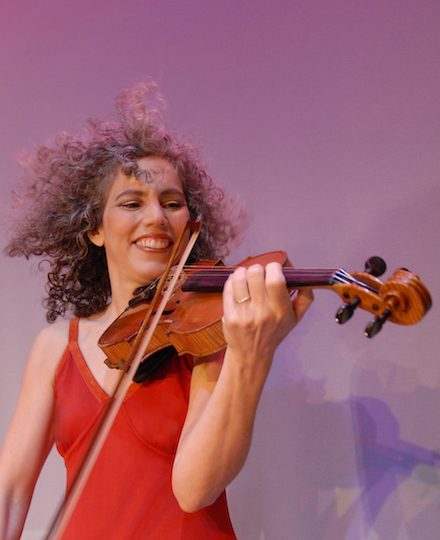(CHATHAM, N.Y. and AMHERST, Mass.) – Alicia Svigals, the greatest living exponent of klezmer violin, bookends our region with performances at PS21 in Chatham on Saturday, July 15, at 8pm, and at the Yiddish Book Center in Amherst on Sunday, July 16, at 3pm, as part of the YIDSTOCK Festival of New Yiddish Music.
Svigals inaugurates the summer season at PS21: Performance Spaces for the 21st Century, with an Opening Night Celebration featuring Alicia Svigals’ Klezmer Fiddle Express. For her PS21 performance, she will be joined by accordionist/vocalist Lauren Brody and double bassist Brian Glassman.
At YIDSTOCK, Svigals will perform in a duo format with accordionist/vocalist Lauren Brody, one of the original klezmer revivalists. Svigals will also give a lecture-demo entitled “The Mysteries of Klezmer Violin Unveiled” at YIDSTOCK on Sunday, July 16, at 4:30pm, in which she will demonstrate the unique ornaments and playing techniques that distinguish klezmer fiddle-playing and give it a singular Jewish voice.
Svigals almost singlehandedly revived the lost art of the klezmer fiddle in her work with the band she cofounded, the Klezmatics. Now considered the world’s leading klezmer fiddler, Svigals has collaborated with artists ranging from Itzhak Perlman (she taught him how to play klezmer) to Led Zeppelin; has appeared on The Late Show with David Letterman, MTV, PBS’s Great Performances, and NPR’s Prairie Home Companion; and can be heard on multiple film and television scores..
Svigals’ dazzling style of playing encourages audiences to participate in the lively, expressive music by dancing, singing, and clapping. “We’re the Jewish equivalent of a sizzling hoedown!” Svigals said. “I wish for the audience to have a musical and spiritual experience. I’d like them to leave feeling like they spent time in a magical, faraway place.”
Klezmer came to the U.S. with the wave of Jewish immigration at the turn of the 20th century, and was first revived in the 1970s. It is the traditional celebration music of Eastern Europe’s Jewish community, tracing back to the Middle Ages. The music incorporates cantorial melody, ancient folk tunes, Yiddish poetry, Hebraic ritual, and Greek and Ottoman influences. Svigals’ program is both instrumental music and song, ancient and new.

